 At the moment, “e-book” and “Kindle” are darn near synonymous. Barnes & Noble aims to change that with multiple announcements it made today. It’s releasing free e-reader applications for Windows, Mac OS X, iPhone, and BlackBerry; it’s opened an e-bookstore with 700,000 titles, including bestsellers for $9.99 apiece; and it’s announced a deal that will make it the exclusive e-bookstore for Plastic Logic’s e-reader, due in 2010.
At the moment, “e-book” and “Kindle” are darn near synonymous. Barnes & Noble aims to change that with multiple announcements it made today. It’s releasing free e-reader applications for Windows, Mac OS X, iPhone, and BlackBerry; it’s opened an e-bookstore with 700,000 titles, including bestsellers for $9.99 apiece; and it’s announced a deal that will make it the exclusive e-bookstore for Plastic Logic’s e-reader, due in 2010.
B&N is saying that its e-bookstore’s 700,000 digital books makes it the largest electronic bookstore (Amazon’s Kindle store has 300,000 books). But it’s also touting more than half a million free public-domain works provided by Google Books. That seems to leave it with fewer examples of recent, copyrighted stuff than Amazon: When I checked the New York Times’ top five bestsellers in hardcover fiction, hardcover nonfiction, paperback trade fiction, and hardcover advice, Amazon had all but one in Kindle format, and B&N had only half. But B&N is superambitious: “The company expects that its selection will increase to well over one million titles within the next year, inclusive of every available eBook from every book publisher and every available eBook original, which is a fast growing marketplace.”
I tried the iPhone and OS X editions of the e-reader software (which are based on the existing apps from B&N subsidiary Fictionwise), and found them to be a mixed bag. On the plus side, the iPhone version has some features that Amazon’s Kindle for iPhone doesn’t, including the ability to choose fonts and opt for justified or unjustified text. But there’s nothing like Amazon’s Whispersync, which keeps track of your place in a book as you move between devices. And B&N’s iPhone-friendly site for finding and buying e-books isn’t as good as Amazon’s: If you know what you’re looking for you can search for it, but you can’t even pull up a list of bestsellers to browse through.
And when I wanted to download one of the free Google Books tomes, I was flummoxed by the process: The B&N site couldn’t decide whether the book was free or cost a penny, and demanded my credit-card information even though the total price was $0.00.
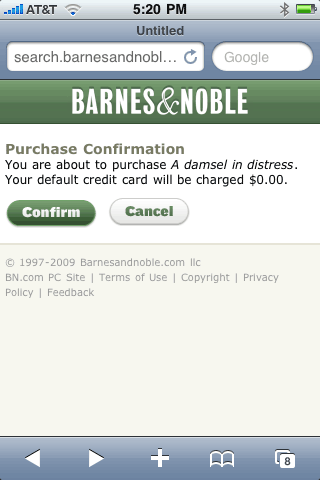
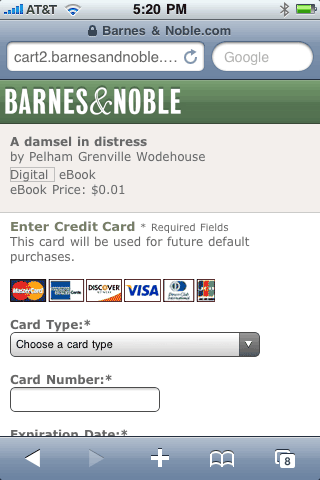
Both B&N and Amazon make you use the iPhone’s Safari if you want to buy books on your phone; I’d much rather they let you do so from within the apps themselves. iPhone OS 3.0’s in-app commerce would let them do that, but they’d have to give Apple a cut of proceeds, so I’m not holding my breath.
All in all, Barnes & Noble’s e-book initiative seems rougher around the edge’s than Amazon’s–which isn’t surprising given that the latter has almost a two-year head start. B&N won’t truly compete head-to-head with the Kindle until the Plastic Logic reader is finally on sale next year, so it’s got some time to refine this first rough draft. I’d love to see Amazon get some serious competition, and long-term, B&N seems to be in as good a position as anyone to provide it.
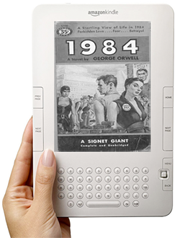 Back in July, Amazon.com endured a bout of bad publicity and inspired debate about the ethics of copy protection when it remotely deleted copies of George Orwell’s 1984 and Animal Farm from customer’s Kindle e-readers after discovering they were pirated. CEO Jeff Bezos eventually apologized and called the action stupid. Now the Wall Street Journal’s Digits blog is reporting that Amazon has e-mailed the Kindle owners whose books it erased and offered to restore the tomes (along with any notes taken) or issue a $30 gift certificate or check.
Back in July, Amazon.com endured a bout of bad publicity and inspired debate about the ethics of copy protection when it remotely deleted copies of George Orwell’s 1984 and Animal Farm from customer’s Kindle e-readers after discovering they were pirated. CEO Jeff Bezos eventually apologized and called the action stupid. Now the Wall Street Journal’s Digits blog is reporting that Amazon has e-mailed the Kindle owners whose books it erased and offered to restore the tomes (along with any notes taken) or issue a $30 gift certificate or check.
 Novelist Nicholson Baker is an unapologetic friend of paper–and his book
Novelist Nicholson Baker is an unapologetic friend of paper–and his book 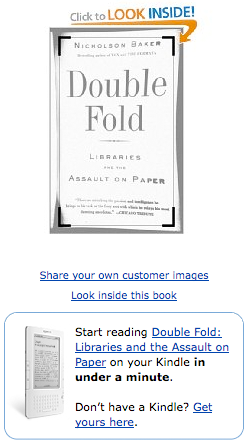




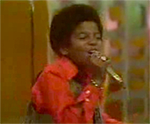 Reasonable people can disagree about just what Michael Jackson’s legacy is, and whether or not he was the biggest pop star of all time. But this much seems pretty much undeniable: He’s the biggest pop star to have died in the Web age. And so the Web is reflecting things about the reaction to his passing that give us more knowledge than we had when Jim Morrison, Jimi Hendrix, Janis Joplin, Elvis Presley, and John Lennon left us.
Reasonable people can disagree about just what Michael Jackson’s legacy is, and whether or not he was the biggest pop star of all time. But this much seems pretty much undeniable: He’s the biggest pop star to have died in the Web age. And so the Web is reflecting things about the reaction to his passing that give us more knowledge than we had when Jim Morrison, Jimi Hendrix, Janis Joplin, Elvis Presley, and John Lennon left us.